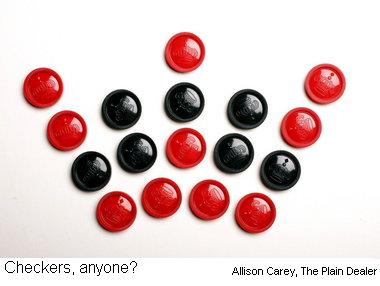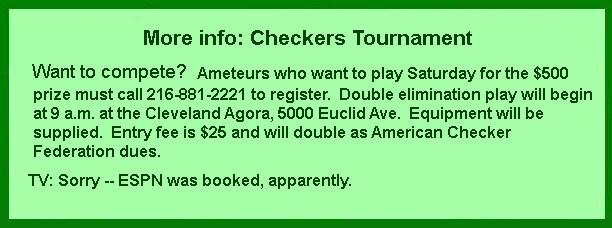By Michael Heaton, The Plain Dealer
Checkers, anyone?
Beginning Saturday, Cleveland will host a world-title
checkers tournament between 10-year reigning champion Alex Moiseyev of
Columbus and Michele Borghetti of Italy.
The two men will play four games a day for seven days. Matches will be at
the ballroom of the Cleveland Agora and at Cleveland's Main Library and
Lewis Stokes Wing auditorium downtown.

Here's where you come in: There will be an opportunity for 100 amateur players to compete for $500 on the first two days of the tournament.
"The title was established in 1934," said Moiseyev, 52, originally from the Soviet Union. "I am the sixth world champion. It's an honorable title, and I intend to defend it. I played Borghetti before, maybe two or three years ago, but not in serious competition.
"I have been playing checkers since I was 7. So I bring experience and professionalism to the tournament.
"That is my strength."
The tournament is taking place in Cleveland thanks to interest from Henry
LoConti and his brother Joe. Joe is a member of the Ohio
Checker Federation, and he and federation president Richard Beckwith landed
the winning bid for this year's competition.

"I joined the Checker Federation after I retired in 1991," said Joe LoConti. "A friend and I played a lot, and we thought we were pretty good. We entered a regional competition in Texas. I lost all 32 matches. My friend won one. We left early, and people complained because they wanted the chance to beat us."
"I joined the Checker Federation after I retired in 1991," said Joe LoConti. "A friend and I played a lot, and we thought we were pretty good. We entered a regional competition in Texas. I lost all 32 matches. My friend won one. We left early, and people complained because they wanted the chance to beat us."
Checkers, if you recall, is played on a board of eight-by-eight squares. On opposite sides of the board are 12 "men" or "checkers," pieces that initially may move and capture diagonally forward. Only when a checker is "kinged" may it move backward or forward. Traditionally pieces are either black, white or red. The opponent's pieces are captured by jumping over them.
Checkers goes way back, but how far is debatable. Some say the Middle Ages. Others say Egypt around 1600 B.C. Standardization came to the game with a set of laws in 1852, giving the game a basic structure still in existence. American checkers, or straight checkers, is a descendant of the British board game "draughts." The most common of two variations of this game is Go As You Please; the other is 3-Move.
Checkers, if you recall, is played on a board of eight-by-eight squares. On opposite sides of the board are 12 "men" or "checkers," pieces that initially may move and capture diagonally forward. Only when a checker is "kinged" may it move backward or forward. Traditionally pieces are either black, white or red. The opponent's pieces are captured by jumping over them.
Checkers goes way back, but how far is debatable. Some say the Middle Ages. Others say Egypt around 1600 B.C. Standardization came to the game with a set of laws in 1852, giving the game a basic structure still in existence. American checkers, or straight checkers, is a descendant of the British board game "draughts." The most common of two variations of this game is Go As You Please; the other is 3-Move.
In 3-Move, the first three moves are selected at random from cards. Players play two games alternating on different sides.
Variations exist throughout the world, including a Polish draughts game that includes 100 squares.
Beckwith, 41, of Willoughby, is president of the Ohio Checker Federation and vice president of the World Body of Checkers.
"My dad played checkers so I have been playing since I was very young and competing in tournaments," said Beckwith, who is a chemist.
While few would doubt the prowess of Moiseyev, Borghetti or Beckwith, one man whose abilities are legendary is Newell Banks.
In the 1920s, the checkers (and chess) player extraordinaire once played 25 chess matches and 81 checkers games simultaneously. He won most. When he was 60, he played six simultaneous checkers games blindfolded for four hours per day for 45 days. His tally: 1,131 wins, two losses and 54 ties.
To reach this Plain Dealer reporter: mheaton@plaind.com, 216-999-4569